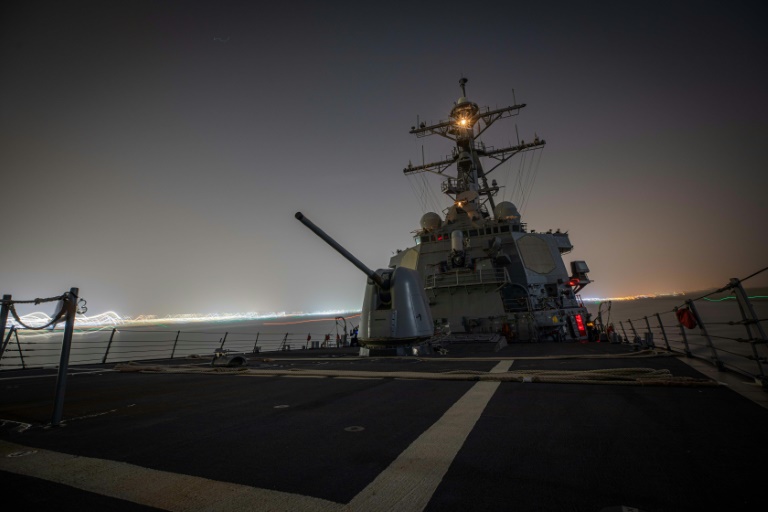Yemen rebels attack Red Sea tankers as shipping firms suspend traffic

The USS Carney shot down 14 drones launched by Yemeni rebels on Saturday
Dubai – Yemen’s Iran-backed Huthi rebels said Monday they had attacked two “Israeli-linked” vessels in the Red Sea in solidarity with Gaza, as more companies halt transit through the troubled but vital waterway.
The attacks on the Norwegian-owned Swan Atlantic and another ship identified by the Huthis as the MSC Clara are the latest in a flurry of maritime incidents that are disrupting global trade in an attempt to force a stop to Israel’s campaign against Hamas militants in Gaza.
In a statement, the rebels said they had carried out a “military operation against two ships linked to the Zionist entity” using naval drones after they refused to respond to calls.
They vowed to “continue to prevent all ships heading to Israeli ports… from navigating in the Arab and Red Seas” until more food and medicine is allowed into Gaza.
The Swan Atlantic’s owner, Norway’s Inventor Chemical Tankers, said in a statement that the ship was carrying biofuel feedstock from France to Reunion Island.
It said the vessel has “no Israeli link” and was managed by a Singaporean firm.
It added there were no injuries among the Indian crew and the vessel sustained only limited damage.
“The crew and the ship are now being assisted by the US Navy and will be brought to safety under protection by naval forces,” it said.
– Shipping crisis –
The incident came as British oil giant BP became the latest to suspend transit.
Frontline, one of the world’s largest tanker companies, also said Monday it was rerouting ships away from the Red Sea.
“We only allow new business to be concluded if routing via” South Africa’s Cape of Good Hope an option, it said.
German transport company Hapag-Lloyd, which had said it was halting Red Sea container ship traffic until Monday, announced that it was rerouting ships via the Cape of Good Hope.
“This will be done until the passage through the Suez Canal and the Red Sea will be safe again for vessels and their crews,” it said in a statement.
The Belgian-headquartered Euronav shipping company said it too was avoiding the Red Sea “until further notice”.
The latest announcements followed similar moves by Danish shipping giant A.P Moller-Maersk — which accounts for 15 percent of the global container freight market.
Italian-Swiss giant Mediterranean Shipping Company and France’s CMA CGM have also taken similar measures.
The Red Sea attacks have forced insurance companies to significantly increase premiums on ships transitting the area, making it uneconomical for some to transit through the Suez Canal.
The rerouting via the Cape of Good Hope, however, makes for a longer voyage distance, adding to fuel costs.
“The frequency of serious attacks over the last week means that what has now become a maritime security crisis threatens much wider commercial and economic implications in the region and beyond,” Torbjorn Soltvedt of the risk intelligence firm Verisk Maplecroft told AFP.
– US efforts –
Monday’s attack took place as Pentagon chief Lloyd Austin visited Bahrain, home base of the US Navy’s Fifth Fleet, as part of a Middle East tour that will also take him to Israel and Qatar.
In Manama, he was to discuss “US efforts to convene multilateral coalitions to respond to aggression at sea that threatens shipping and the global economy,” a Pentagon statement said at the weekend.
On Saturday, a US destroyer shot down 14 drones in the Red Sea launched from rebel-controlled areas of Yemen, the US military said.
And the British government said one of its destroyers had also brought down a suspected attack drone in the area.
Rebel spokesman Mohammed Abdul Salam said that neutral Oman had launched mediation efforts to safeguard shipping using the waterway.
“Under the sponsorship of our brothers in the Sultanate of Oman, communication and discussion continue with a number of international parties regarding operations in the Red Sea and Arabian Sea,” he said on X, formerly Twitter.
The Gaza war broke out when its rulers Hamas launched an unprecedented attack on Israel on October 7, killing around 1,140 people and kidnapping some 250, according to an AFP tally based on official Israeli figures.
Gaza’s health ministry says Israel’s military response has killed more than 19,450 people, mostly women and children.
